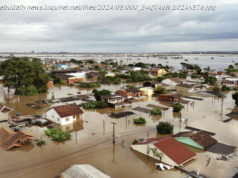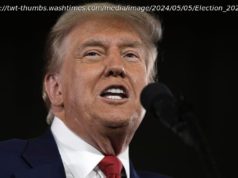The Trump administration is imposing sanctions directly on Venezuela’s President Nicolas Maduro after the vote on Sunday that was a step toward rewriting his country’s constitution….
The Trump administration is imposing sanctions directly on Venezuela’s President Nicolas Maduro after the vote on Sunday that was a step toward rewriting his country’s constitution.
In an unusual move against a foreign leader, the Treasury Department’s designation freezes any of Maduro’s assets subject to US jurisdiction and prevents US persons from dealing with him. The measures were announced in a statement on the Treasury’s website on Monday.
“Yesterday’s illegitimate elections confirm that Maduro is a dictator who disregards the will of the Venezuelan people, ” Treasury Secretary Steven Mnuchin said in a statement. “By sanctioning Maduro, the United States makes clear our opposition to the policies of his regime and our support for the people of Venezuela who seek to return their country to a full and prosperous democracy.”
An official from Venezuela’s Office of the President declined to comment and calls placed to the Information Ministry weren’ t immediately returned.
The constituent assembly chosen Sunday will meet as soon as this week to discuss changing the charter rewritten under former socialist leader Hugo Chavez, who is still revered as the inspiration for the revolution that Maduro claims to lead. The opposition says the rewrite is meant to replace a critical congress and delay general elections.
Maduro has presided over an increasingly autocratic regime that has imperilled the country’s six-decade democracy and left the economy and society in shambles. The country has become engulfed in a political and economic crisis that has soldiers patrolling the streets and citizens stockpiling scarce food and water.
Venezuela braces for more deadly protest after ‘sham’ election to empower President Nicolas Maduro draws international condemnation
The US had increased its pressure on Maduro’s government ahead of the vote, with President Donald Trump promising “strong and swift economic actions” if it took place.
Venezuela, a founding member of Opec, has the world’s largest proven reserves and is South America’s largest oil exporter. It’s the third-largest supplier to the US, sending 10 per cent of its imports last year and is the top supplier to refineries on the US Gulf Coast, home of the largest cluster of refiners in the world.
Less than a week before Sunday’s vote, the US sanctioned 13 senior Venezuela officials, including the interior minister and the national oil company’s vice president for finance, which sparked defiance and condemnation from Maduro. In February, it put Venezuelan Vice President Tareck El Aissami on a list of foreign nationals subject to economic sanctions because of suspected ties to the narcotics trade.
There was tension inside the White House in recent weeks about which additional measures to adopt, including a potential ban on oil imports, according to people familiar with the discussions. The debate reflected concerns over the potential impact on US gasoline prices and over the humanitarian situation in Venezuela, said the people, who asked not to be identified discussing internal deliberations.
While the National Security Council views limiting Venezuelan crude as a powerful weapon, the State Department has argued that cutting off a major piece of the country’s foreign trade could harm already suffering Venezuelans. There is significant sensitivity to the impact on Venezuelan people, one of the people said.
The American Fuel and Petrochemical Manufacturers, the largest association of US refiners, had urged Secretary of State Rex Tillerson, Commerce Secretary Wilbur Ross and other cabinet officials to exempt Venezuelan crude imports from a possible sanctions package.
Bets on a Venezuelan default are climbing. The implied probability of the country missing a payment over the next year has risen to 62 per cent, according to data compiled by Bloomberg on credit-default swaps. That’s the highest level since March 2016.
Investors’ bets reflect international concerns about the nation’s shaky political standing. The European Union “has grave doubts” about whether the election results can be recognised, spokeswoman Mina Andreeva said on Monday.
Brazil, Colombia, Peru, Argentina, Chile and Panama issued statements saying they wouldn’ t recognise Sunday’s vote, while US Ambassador to the United Nations Nikki Haley said she would not accept an illegitimate government.






